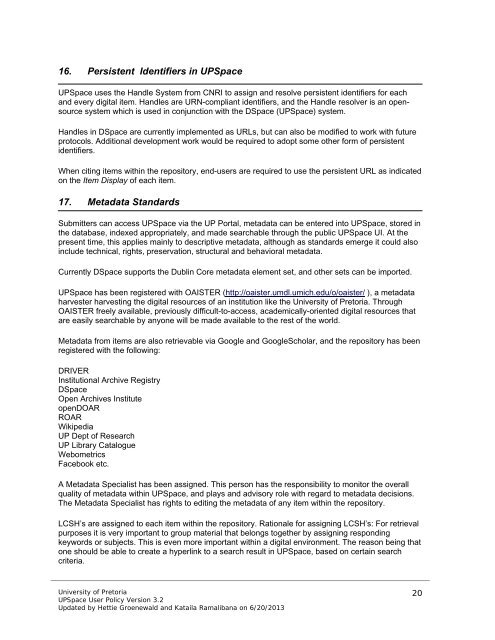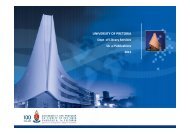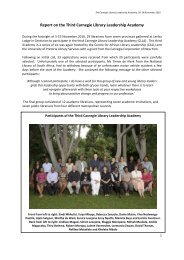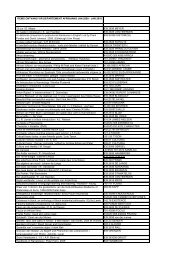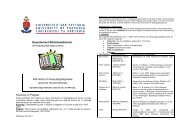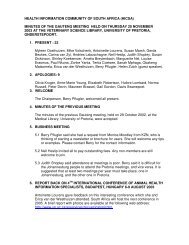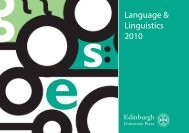UPSpace Policy - Library - University of Pretoria
UPSpace Policy - Library - University of Pretoria
UPSpace Policy - Library - University of Pretoria
Create successful ePaper yourself
Turn your PDF publications into a flip-book with our unique Google optimized e-Paper software.
16. Persistent Identifiers in <strong>UPSpace</strong><br />
<strong>UPSpace</strong> uses the Handle System from CNRI to assign and resolve persistent identifiers for each<br />
and every digital item. Handles are URN-compliant identifiers, and the Handle resolver is an opensource<br />
system which is used in conjunction with the DSpace (<strong>UPSpace</strong>) system.<br />
Handles in DSpace are currently implemented as URLs, but can also be modified to work with future<br />
protocols. Additional development work would be required to adopt some other form <strong>of</strong> persistent<br />
identifiers.<br />
When citing items within the repository, end-users are required to use the persistent URL as indicated<br />
on the Item Display <strong>of</strong> each item.<br />
17. Metadata Standards<br />
Submitters can access <strong>UPSpace</strong> via the UP Portal, metadata can be entered into <strong>UPSpace</strong>, stored in<br />
the database, indexed appropriately, and made searchable through the public <strong>UPSpace</strong> UI. At the<br />
present time, this applies mainly to descriptive metadata, although as standards emerge it could also<br />
include technical, rights, preservation, structural and behavioral metadata.<br />
Currently DSpace supports the Dublin Core metadata element set, and other sets can be imported.<br />
<strong>UPSpace</strong> has been registered with OAISTER (http://oaister.umdl.umich.edu/o/oaister/ ), a metadata<br />
harvester harvesting the digital resources <strong>of</strong> an institution like the <strong>University</strong> <strong>of</strong> <strong>Pretoria</strong>. Through<br />
OAISTER freely available, previously difficult-to-access, academically-oriented digital resources that<br />
are easily searchable by anyone will be made available to the rest <strong>of</strong> the world.<br />
Metadata from items are also retrievable via Google and GoogleScholar, and the repository has been<br />
registered with the following:<br />
DRIVER<br />
Institutional Archive Registry<br />
DSpace<br />
Open Archives Institute<br />
openDOAR<br />
ROAR<br />
Wikipedia<br />
UP Dept <strong>of</strong> Research<br />
UP <strong>Library</strong> Catalogue<br />
Webometrics<br />
Facebook etc.<br />
A Metadata Specialist has been assigned. This person has the responsibility to monitor the overall<br />
quality <strong>of</strong> metadata within <strong>UPSpace</strong>, and plays and advisory role with regard to metadata decisions.<br />
The Metadata Specialist has rights to editing the metadata <strong>of</strong> any item within the repository.<br />
LCSH’s are assigned to each item within the repository. Rationale for assigning LCSH’s: For retrieval<br />
purposes it is very important to group material that belongs together by assigning responding<br />
keywords or subjects. This is even more important within a digital environment. The reason being that<br />
one should be able to create a hyperlink to a search result in <strong>UPSpace</strong>, based on certain search<br />
criteria.<br />
<strong>University</strong> <strong>of</strong> <strong>Pretoria</strong><br />
<strong>UPSpace</strong> User <strong>Policy</strong> Version 3.2<br />
Updated by Hettie Groenewald and Kataila Ramalibana on 6/20/2013<br />
20


